
Seattle, Washington, is a city on the rise with the local population, job opportunities, and average salary continuing to increase steadily year after year. What is it about this region that has made it such an in-demand location for job-seekers and career advancers alike?
While many may credit Seattle’s growth solely to the popularity of local tech companies like Amazon and Microsoft, there are a number of defining factors that have put Seattle and its local job market on the map. Read on to learn about what it’s like to live and work in Seattle, and how obtaining a degree from a regional-specific institution has the potential to set you on a strategic path toward success.
Living in Seattle
Seattle has a metro population of 3,735,216, and this number only continues to increase over time. The city was named the decade’s fastest-growing in all of America for 2017, and the second-fastest growing in 2018, adding up to an overall 18.7 percent change since 2010.
The quality of life in Seattle is high, ranking among the top 20 in America for 2019 in regard to factors like safety, purchasing power, healthcare, traffic, pollution, and more. Alongside the state of Washington’s coveted ranking as the number one Best State in the U.S. in 2019, U.S. News and Report also listed Seattle itself as ninth on its list of Best Places to Live.
Cost of Living in Seattle
The cost of living in Seattle is significantly higher than the national average, a common reality among highly populated, metropolitan cities with an array of job high-quality opportunities for residents.
Did You Know: Compared to other similarly-scaled locations, Seattle has an overall cheaper cost of living, requiring less to live annually than in New York City, San Francisco, or Washington D.C.
According to PayScale, rent in Seattle costs an average of $2,111 per month, and the average cost of a home is $673,874. The cost of energy, however, is cheaper in Seattle than almost anywhere else in the country due to a high number of hydroelectric power plants in use throughout Washington state. The state also doesn’t charge residents with personal income tax, keeping costs down in that regard, as well.
Seattle’s Regional Culture
Although Seattle’s reputation as a rainy city doesn’t always paint the location in the most favorable light, people who live in Seattle have a lot to love about their city.

Seattle offers beautiful views of the Northwest region, as well as semi-local access to two of the top 25 best ranked national parks in America. The local climate is also a draw, with temperatures remaining fairly consistent year-round including average highs of 58.8 and lows of 45.1. Seattle’s location has also influenced the city’s environmental consciousness; it was voted the sixth greenest city in the U.S. and has been ranked a 5-star certified community for national leadership in sustainability.
Culture-wise, Seattle has many top restaurants featuring local cuisine, which includes, most notably, fresh seafood. The city is also known for being extremely dog-friendly (it was named the most dog-friendly city in America by Rover.com) and for being the most well-read city in America.
Working in Seattle
Seattle’s economy is booming, offering a substantial number of job opportunities for individuals living and working in the region, and an above-average career outlook. Residents of this city earn a median amount of $63,120 per year—a full $12,500 more than the national average.
Statewide, the unemployment rate is down from 10.4 percent in 2010 to 4.6 percent as of July 2019. The unemployment rate in Seattle itself is only 3.9 percent, and the job growth rate in the city is expected to remain at a steady 2.4 percent for the remainder of 2019.
5 Top Industries in Seattle
A few key industries define Seattle’s current economic landscape, including:
1. The Technology Industry
The technology industry continues to be a top player in Seattle’s economy. Alongside tech giant, Amazon, big-name organizations like Microsoft, Expedia, and Zillow, have been drawing an exceptional amount of tech-based talent to the area, allowing an already growing industry to continue increasing at a rapid rate. From 2016 to 2017, Seattle added a total of 33,000 new tech jobs—a 25.7 percent growth. These numbers are expected to continue to rise as Seattle defines itself as one of the top technology hubs in the country.
2. The STEM Industry
STEM roles—including those in science, engineering, mathematics, and technology—are also popular in Seattle. According to commercial real estate organization, CBRE, roles in this industry have increased in this city by 8.1 percent from 2014 to 2018. This has led to a whopping 230,000 new, local jobs in all of the STEM industry in that time, and has driven Seattle to rank as the eighth largest STEM cluster in America.
3. The Manufacturing Industry
Manufacturing is the oldest and one of the most substantial industries in Seattle. Led by Boeing—“the world’s largest aerospace company”—the manufacturing industry in Seattle has been a staple in the local economy for decades. Other local top players in this industry include Honeywell Aerospace, Philips, and GE Healthcare. Overall employment in this industry has increased by 5.6 percent in the past 12 months.
Learn More: Highest Paying Jobs & Industries in Seattle
4. The Business & Professional Services Industry
The tech companies in Seattle have brought with them a variety of business roles. According to the Bureau of Labor Statistics, jobs in the business and financial sector account for a total of 8 percent of the entire city’s employment, followed by jobs in management (5.6 percent), jobs in sales for (9.3 percent), and jobs in office and administrative support (13.3 percent.)
5. The Healthcare Industry
As of 2018, there were 55,880 jobs in Seattle’s healthcare sector and these numbers have continued to rise due to the growing population and localized advancements in technology. In a recent article published in The Seattle Times, Megan Slabinski, a district president with staffing firm Robert Half, explained that the large tech presence in Seattle has caused this dynamic evolution and expansion of the healthcare system in the region, as hospitals and medical facilities work to modernize their operations through available technology.
Discover Northeastern University—Seattle
Learn more about the industry-aligned graduate programs designed to help working professionals achieve their career goals.
5 Top Brands & Companies in Seattle
Even with such a vast array of different industries defining Seattle’s economy, there are a few organizations that rise to the top as some of the most notable in the city.
Learn More: Top Tech Companies in Seattle
1. Amazon
Perhaps unsurprisingly, Amazon is the first on the list of top companies in Seattle. This tech giant set its headquarters up in the city in 2010 and has only continued to grow in size and notability since. At the end of 2018, Amazon employed roughly 650,000 workers, more than 30,000 of which were based in Seattle. The company has since been on a recruitment spree, with an anticipated 30,000 more job openings becoming available in early 2020. Find open opportunities on Amazon’s Careers Page.
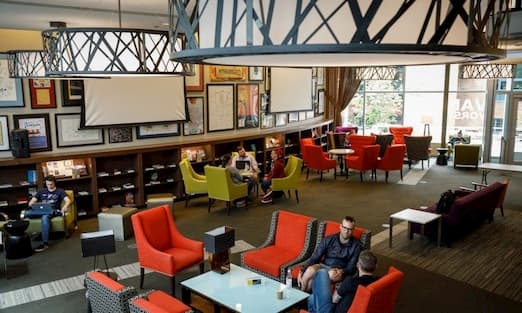
2. Starbucks
This famous coffee chain’s headquarters is in Seattle, though it employs 291,000 individuals at 30,000 locations around the world. Workers at the Seattle location handle a variety of financial, marketing, sales, and other business-related aspects of the organization. Starbucks is also known as one of the best employers in the country, making the top 100 in a variety of Forbes annual top employers lists in 2019, including ranking 31st for America’s Best Employers by State, 35th as the World’s Most Valuable Brands, and 94th for America’s Best Employers 2019. Find open opportunities on Starbucks’ Corporate Careers Page.
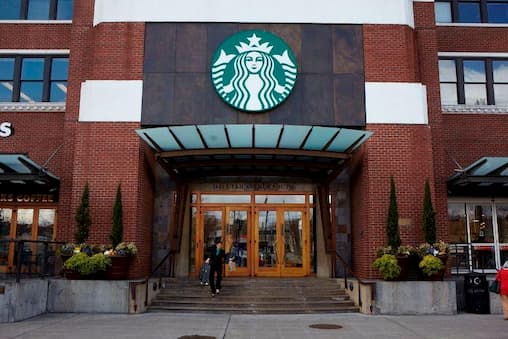
3. Microsoft
Microsoft, another Fortune 500 technology company, has also set up its headquarters in the greater Seattle area. Known primarily for the creation of some of the most famous software and operating systems in the world, Microsoft employs 144,106 employees globally—51,854 of which work out of the Washington location. Of all their employees, 45 percent work in engineering, with “worldwide commercial business” and “global sales maintenance and operations” making up the second-highest job functions at 17.9 percent and 15.9 percent, respectfully. Find open opportunities on Microsoft’s Careers Page.
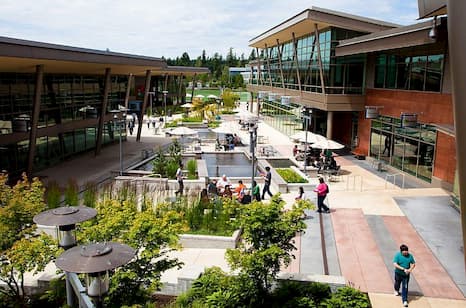
4. Expedia Group
Known as “the world’s travel platform,” Expedia owns and maintains over 20 individually branded sites and services, including popular names like Hotels.com, Trivago, and Hotwire. The company employs more than 24,000 individuals in more than 30 countries worldwide, and is currently planning to move its 4,500 local employees to an “iconic waterfront Seattle campus. In 2019, the company was also ranked among the Best Places to Work by Glassdoor. Find open opportunities on Expedia Group’s Careers Page.
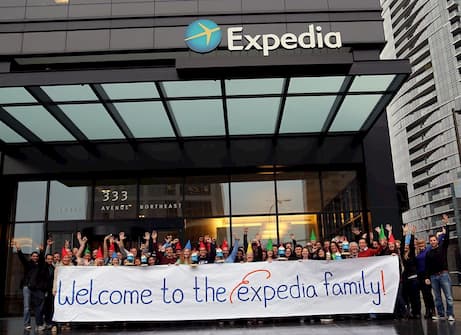
5. Nordstrom
This popular, high-end retail company is known for its clothing, shoe, and accessory brands. Its corporate headquarters are in Seattle,
ranking it among the top brands in the area, though it employes a total of 74,000 employees across 40 states and Canada. Top local roles at Nordstrom include those in marketing and public relations, merchandising, information technology (IT), and more. Forbes also ranked the company as one of the Best Employers for Women and Best Employers by State in 2019. Find more open opportunities on Nordstrom’s Careers Page.
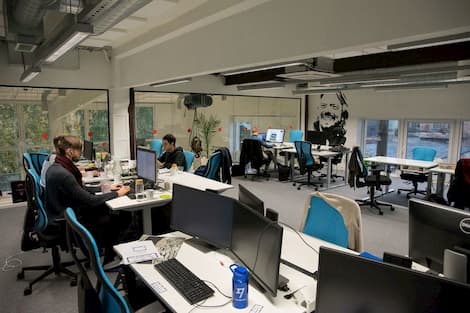
5 Top Careers in Seattle
Although the array of top companies and brands in Seattle provide opportunities for individuals on any career path to succeed, there are a few positions in the city that are most common among residents.
1. Software Engineer
Responsibilities: This popular computer science job requires work in both the design and development stages of software creation. Individuals in these roles are primarily in charge of ensuring the programs created by the software developers function as planned.
Training & Education: Those who hold a software engineer title likely have either a bachelor’s degree alongside extensive fieldwork or a Master of Science in Computer Science degree.
Seattle-Specific Salaries: Careers in software engineering are particularly prevalent in Seattle, as the three top roles in the city include software engineers, software development engineers, and senior software engineers, respectively. In Seattle, individuals in these roles earn far above the national average for each position, with software engineers making an average of $103,111 per year, software development engineers making an average of $109,621 per year, and senior software engineers making an average of $132,503 per year.
2. Project Manager
Responsibilities: The responsibilities of a project manager can vary greatly depending on the industry and the scope of work they are overseeing. In general, however, most project managers are in charge of seeing a project through from creation to completion, including managing timelines, communicating with team members and stakeholders, developing project scopes, handling deliverables, overseeing the budget, and much more.
Training & Education: Project managers in mid- to senior-level roles often have a Master of Science in Project Management degree.
Seattle-Specific Salary: Project managers in Seattle specifically make an average of $78,295 per year compared to the $73,462 per year made on average, nationally.
3. Operations Managers
Responsibilities: Operations managers are in charge of ensuring that operations within their organization are running as smoothly and efficiently as possible. Primarily, this includes identifying problems in processes as well as opportunities for improvement, handling budgeting, planning, reporting, and auditing, ensuring regulatory compliance, and more.
Training & Education: Although some companies may consider aspiring operations managers with only a bachelor’s degree, many employers—especially in a competitive market like Seattle—require a master’s degree from their candidates. Individuals might pursue a Master of Business Administration (MBA) or a Master of Science in Project Management to acquire these skills.
Seattle-Specific Salary: Operations managers in Seattle make an average of $65,657 per year, compared to the national annual average of $64,004.
4. Software Developer
Responsibilities: Individuals in these roles work with system engineers and computer programmers to create computer applications that can carry out specific tasks. They are comfortable working with complex systems and are familiar with common programming languages such as C++, Python, Java, and more.
Training & Education: A bachelor’s degree in computer science, software engineering, IT, or other relevant fields may be enough to break into this career, however, considering the constantly changing trends in technology, many software developers today are opting to continue their studies with a Master of Science in Computer Science degree.
Seattle-Specific Salary: Software developers, in general, make an average total of $70,515 per year. In Seattle, however, the demand for individuals with these skills has increased the average salary to $89,456 per year—a whopping $18,941 more, annually.
5. Marketing Manager
Responsibilities: Marketing managers are in charge of overseeing the promotion of an organization, brand, or product through campaigns and sales efforts. Individuals at this higher level must be able to oversee input from various teams, including research, design, content, sales, and advertising.
Training & Education: Most individuals who hold a marketing manager role have advanced education in the field. This may take the form of a master’s degree in marketing or an MBA with a Marketing Concentration.
Seattle-Specific Salary: Marketing managers in Seattle make an average of $71,170 per year, which rounds up to almost $7,000 more annually than the national average salary of $64,403 per year.
Competitive Job Market
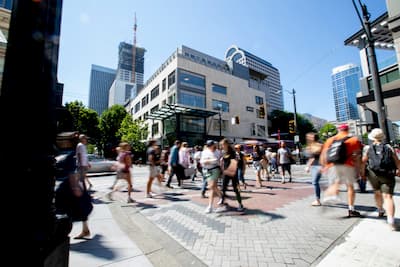
As the high salaries among top jobs in Seattle suggest, the job market in this area is flourishing. However, alongside great job opportunities like these come the natural rush of qualified individuals looking to land a coveted role at one of the top companies in the area.
With thousands of prospective applicants all vying for the same positions, it’s vital that local and transplant Seattleites alike take the necessary steps to stand out among the sea of qualified candidates.
Some of the best ways to stand out in a competitive job market include:
- Acquiring hands-on experience (preferably at the company in which you wish to work).
- Using the power of your network.
- Advancing your education.
While each of these approaches can be pursued individually, those who are truly committed to advancing their career may also consider enrolling in a graduate degree program at a university like Northeastern. These programs provide opportunities for networking, experiential learning, and a chance for students to expand their career-relevant skill sets—all at the same time.
Studying in Seattle
Those who strategically want to advance their careers in a specific location like Seattle should also consider the benefits of receiving a degree from an institution in that area. Doing so can provide students with local opportunities and contacts that can help distinguish them from other applicants during a job search.
Did You Know: Universities like Northeastern understand that this kind of region-specific advanced education can play a key role in students’ overall success. To provide individuals in cities across North America with opportunities to excel through the pursuit of a graduate degree, Northeastern has expanded to include five regional locations alongside their Boston campus, including Charlotte, Toronto, Vancouver, the San Francisco | Bay Area, and Seattle.
These regional locations have each been designed with the demands of the local job market and the most popular careers within each region in mind. In Seattle, for example, popular program offerings include the Master of Science in Computer Science, Master of Professional Studies in Analytics, and Master of Science in Information Systems, among others.
Read on to explore what graduate students at Northeastern University—Seattle will have the chance to experience during their programs that will help set them up to land a coveted role in Seattle’s competitive job market post-graduation.
Work Alongside Industry Leaders
Top universities like Northeastern recognize the impact that proper hands-on learning can have on both a student’s educational experience and future career opportunities. For this reason, 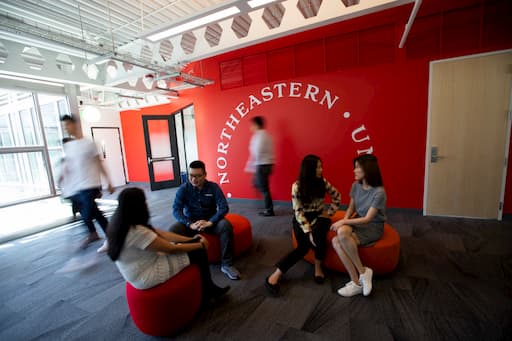 Northeastern has included experiential learning as a core component in its approach to education. These experiential learning opportunities—such as co-ops or internships—allow students the chance to translate the skills learned in the classroom to the workplace.
Northeastern has included experiential learning as a core component in its approach to education. These experiential learning opportunities—such as co-ops or internships—allow students the chance to translate the skills learned in the classroom to the workplace.
From a job-seeking perspective, experiential learning gives students the chance to learn first-hand what organizations actually value from their employees. They can then begin to better understand the soft skills, practical abilities, and experience employers prefer from candidates, and strategically work to improve their own qualifications to better meet those standards moving forward. What’s more, having the chance to meet and work alongside others in their field is a great way to learn about job opportunities and develop relationships with industry professionals that might act as a reference or provide a positive recommendation down the line.
Grow Your Local Network
In today’s workplaces, 85 percent of jobs are filled through networking. In fact, many jobs never even make it to job posting sites, and are, instead, being filled by the connections current employees have in their networks.
Learn More: 7 Networking Tips for Graduate Students
Luckily, graduate school provides an array of unique and impactful opportunities for networking. Between introductions to classmates and professors that share a passion for your field, invitations to industry-aligned or alumni events, and exposure to big-name organizations through experiential learning, students will have ample chances to meet and connect with important people in their industry—connections which can help them land an in-demand role in your field later on.
Expand Your Skills Sets
Especially in a competitive job market like Seattle’s, candidates with the right combination of skills in each industry will stand out among the masses. Obtaining a graduate degree is an efficient way for students to hone the abilities they do have while simultaneously filling in any gaps in their knowledge with tailored courses aimed at creating well-rounded, working professionals.
Even students who feel they gained a solid understanding of the skills and practices that relate to their field during the pursuit of their undergraduate degree can benefit from exploring their subject area further. Taking courses that will keep them up-to-date with the evolving trends of their industries will help them remain relevant, and allow them to stand out in a job interview.
Graduate school also provides a great opportunity for students to declare a specialization in their area of study, tailoring their knowledge and skills that much more closely to the work they hope to complete within organizations post-graduation.
Consider Northeastern University—Seattle
Those looking to land a role in one of Seattle’s top industries or companies should consider earning a graduate degree at a region-specific institution like Northeastern University—Seattle. Advancing your education with Northeastern will provide unmatched opportunities for hands-on learning, networking, and skill development that can help keep you competitive among other job-seekers, land a coveted role, and, ultimately, to thrive as part of Seattle’s flourishing community.

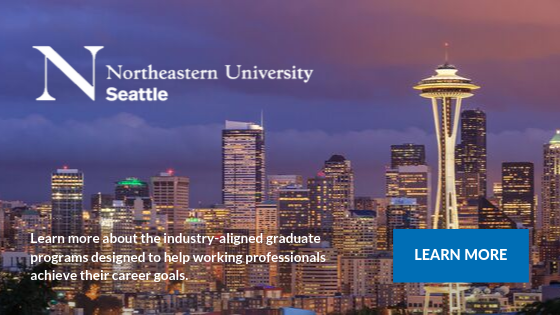




Related Articles
Why Earn a Professional Doctoral Degree?
5 Tips to Get the Most out of Grad School
Is Earning a Graduate Certificate Worth It?